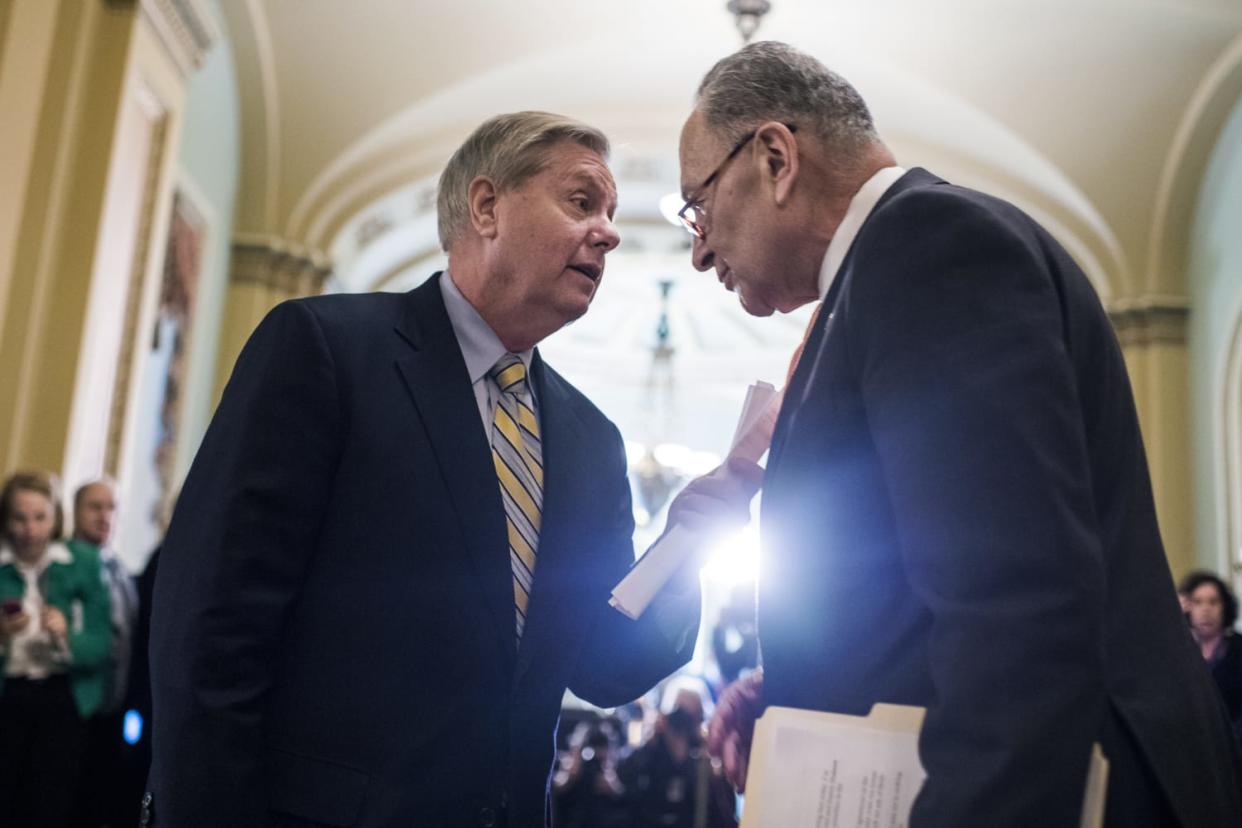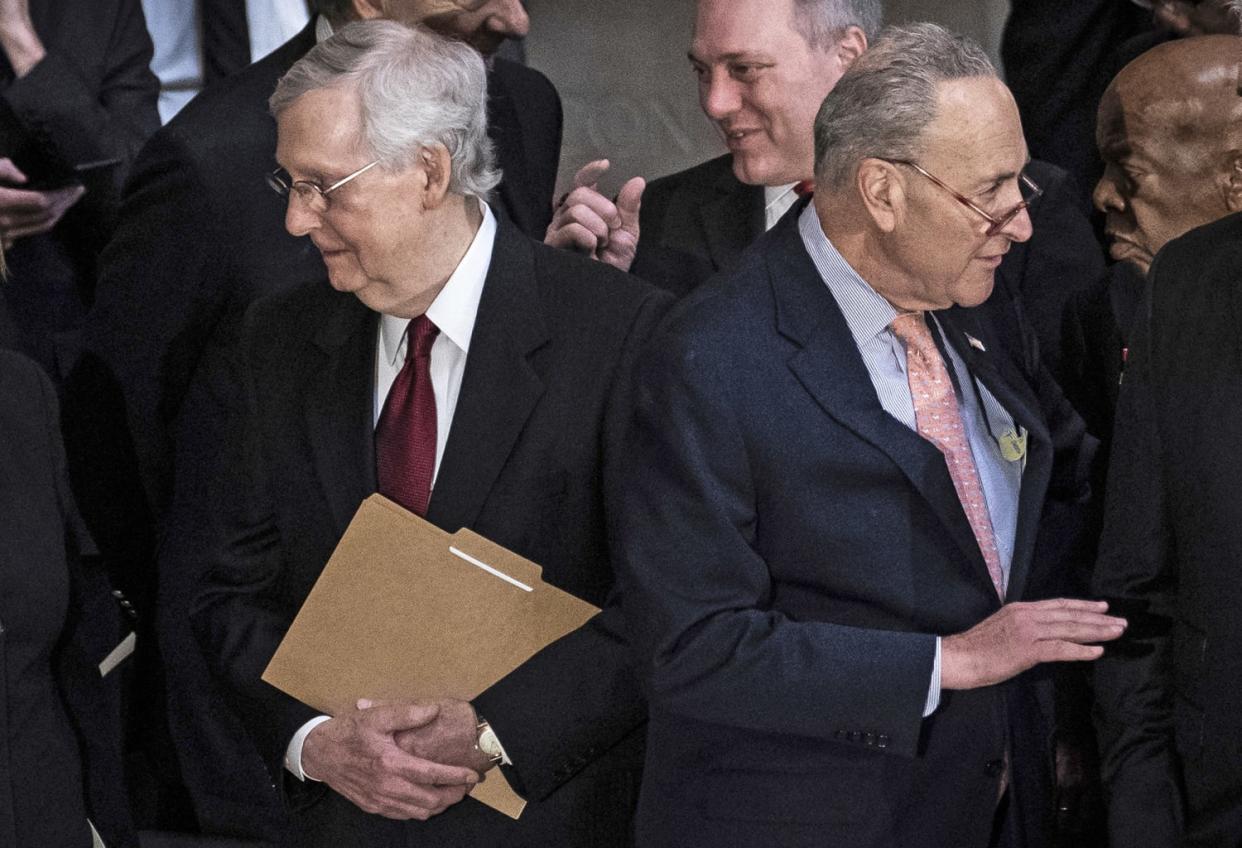McConnell plans final push on Trump judges
WASHINGTON — While President Donald Trump continues to make noise about the election, Senate Majority Leader Mitch McConnell is quietly using the final days of Trump's administration to make one last push to transform the judiciary and seal the president’s legacy.
In just four years, Trump has outpaced previous presidents and selected more than 1 in every 4 federal judges, including one-third of the Supreme Court. And these judges are unlike jurists selected by his predecessors. They were picked with a unique formula: young and ideologically conservative.
“These appointees to the bench serve life tenure and, as a result, they will be shaping jurisprudence in our country for the next two generations,” said Leonard Leo, a conservative legal advocate and top adviser to the Trump administration on selecting judges.
In an interview, Leo said Trump’s 229 appointees are largely “young,” “extremely talented” and ready to “enforce the structural limits on government power contained in our Constitution.”
On Friday, McConnell teed up a new round of votes on judicial nominees. The Senate is slated to vote Monday on Thomas Kirsch, a 46-year-old U.S. attorney, to fill the seat vacated by Justice Amy Coney Barrett, whom Republicans confirmed to the Supreme Court the week before the 2020 election.
The move embodies the McConnell-era Senate — often a dead zone for legislative activity, but a well-oiled machine for confirming conservative judges, with Democrats all but powerless to stop it.
Still, some will try. The progressive judicial group Demand Justice plans to purchase advertisements to appear in Washington, D.C., opposing the lame-duck confirmations, according to a source familiar with its plans.
Democratic leaders say the GOP is using the courts to advance an activist right-wing agenda.
“Senate Republicans know their agenda is so radical and unpopular that they can only achieve it in courts,” said Senate Minority Leader Chuck Schumer.
Trump's legacy
The conservative movement may be demographically shrinking in the U.S., but no matter what happens in upcoming elections, it will retain a strong voice in the courts — including on economic issues like protecting business owners and restricting federal authority to regulate and on cultural issues like assuring gun rights, preserving a role for religion in politics and limiting abortion and voting rights.
“It's going to have a significant consequence in terms of judicial decisions for years to come,” Senate Judiciary Chair Lindsey Graham, R-S.C., told NBC News, calling the judges “solid conservatives” who are “mostly young.”

“One of the things that Republicans like is conservative, constitutional judges. And the Trump administration has delivered mightily in that regard,” he said. “It's one of his best achievements.”
But Trump is in some ways a bystander in his own legacy. The legwork in finding and elevating these judges was done by McConnell in tandem with figures like Don McGahn, Trump’s first White House counsel, and Leo, the former executive vice president of the Federalist Society, a network of conservative lawyers and advocates.
Trump gets a briefing book and briefing on each judge, managed by the White House counsel's office and staff secretary. “Occasionally, he'll ask a question about a particular nominee or someone's background,” said Leo, who stepped down from his position at the Federalist Society a year ago.
McConnell paved the way for the Trump-era project by refusing to fill many vacancies during President Barack Obama’s last two years — including, most controversially, one to the Supreme Court.
Trump “deserves enormous credit” for his judges, Leo said, “but it would not have happened without an excited, engaged and willing Republican Senate, and at the center of that a majority leader who has made judicial selection and the transformation of the federal judiciary a priority.”
'Be strategic'
Trump tried to make the Supreme Court a campaign issue — telling voters that Democrat Joe Biden would add seats to the highest court to undo his gains. Biden never made that promise.
But while the Supreme Court got outsized attention, Trump was reshaping the circuit courts, which have the last word in most federal cases. Trump’s impact there has been dramatic.
In less than four years, Trump has named 53 circuit judges — nearly as many as the 55 that Obama appointed in his eight years. Trump’s judges have flipped the majority to Republican appointees on numerous circuits.

While Obama’s nominees brought unprecedented racial and gender diversity to the bench, Trump’s picks are predominantly white and male.
“We have yet to see the full ramifications of these 200-plus judges, appointed in an unprecedented rush to remake the courts in the image of the far-right fringe of the Republican Party,” said Sen. Richard Blumenthal, D-Conn., a member of the Judiciary Committee.
Americans “will feel their impact” for decades, said Sen. Mazie Hirono, D-Hawaii.
She predicted challenges to LGBTQ rights, civil rights, voting rights and abortion access.
“There's an entire array of these kinds of issues that will come through the judiciary and a lot of them will end up in the Supreme Court,” she said.
Biden will take office next month with the opportunity to re-balance the courts in his image. He said little about his plans in the campaign, other than to promise to put the first Black woman on the Supreme Court.
But the Georgia runoffs loom over his ambitions. If Democrats win both seats, they’ll capture control of the Senate and determine who can be considered. If Republicans hold one or both, McConnell will decide who gets a vote and who doesn’t.
“We need to push our nominees just as they did theirs — with the same sense of determination,” Blumenthal said. “We need to be strategic, just as they were.”
Hirono declined to say how a Republican-led Senate could affect Biden’s ambitions for the courts.
“We intend to win in Georgia,” she said. “So hold that thought.”
